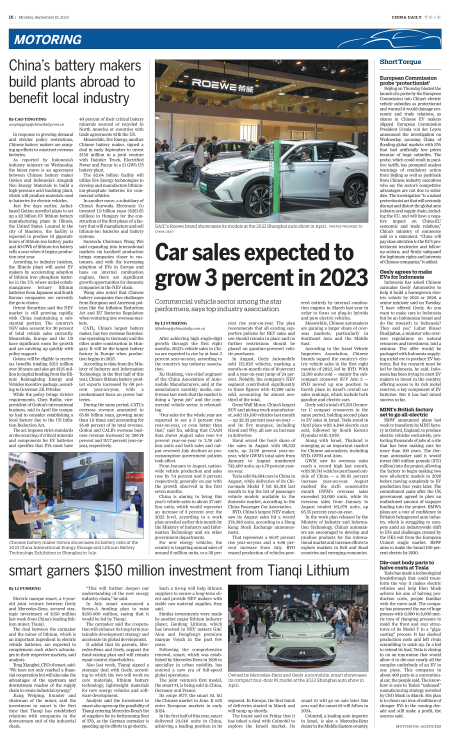European Commission probe 'protectionist'
Beijing on Thursday blasted the launch of a probe by the European Commission into China's electric vehicle subsidies as protectionist and warned it would damage economic and trade relations, as shares in Chinese EV makers slipped. European Commission President Ursula von der Leyen announced the investigation on Wednesday, accusing China of flooding global markets with EVs that had artificially low prices because of huge subsidies. The probe, which could result in punitive tariffs, has prompted analyst warnings of retaliatory action from Beijing as well as pushback from Chinese industry executives who say the sector's competitive advantages are not due to subsidies. The investigation "is a naked protectionist act that will seriously disrupt and distort the global auto industry and supply chain, including the EU, and will have a negative impact on China-EU economic and trade relations," China's ministry of commerce said in a statement. "China will pay close attention to the EU's protectionist tendencies and follow-up actions, and firmly safeguard the legitimate rights and interests of Chinese companies," it added.
Geely agrees to make EVs for Indonesia
Indonesia has asked Chinese carmaker Geely Automotive to help it build a homegrown electric vehicle by 2025 or 2026, a senior minister said on Tuesday. "I have offered Geely, do you want to make cars in Indonesia but be an Indonesian brand and do the research in Indonesia? They said yes," Luhut Binsar Pandjaitan, a minister who oversees regulations on natural resources and investment, told a seminar. The offer would be packaged with Indonesia supplying nickel ore to produce EV batteries. But the research must be led by Indonesia, he said. Indonesia has been trying to court EV makers to invest in the country, offering access to its rich nickel reserves, a key component of EV batteries. But it has had mixed success so far.
MINI's British factory set to go all-electric
BMW announced plans last week to transform its MINI factory in Oxford, England, to produce electric vehicles exclusively, protecting thousands of jobs at a site that has been making cars for more than 100 years. The German automaker said it would invest 600 million pounds ($751 million) into the project, allowing the factory to begin making two new all-electric models in 2026 before moving completely to EV production four years later. The commitment came after the UK government agreed to plow an undisclosed amount of taxpayer funding into the project. BMW's plans are a vote of confidence in Britain's beleaguered auto industry, which is struggling to compete amid an industry-wide shift to EVs and challenges created by the UK's exit from the European Union's single market. BMW aims to make the brand 100 percent electric by 2030.
Die-cast body parts to halve costs at Tesla
Tesla has made a technological breakthrough that could transform the way it makes electric vehicles and help Elon Musk achieve his aim of halving production costs, people familiar with the move said. The company has pioneered the use of huge presses with 6,000 to 9,000 metric tons of clamping pressure to mold the front and rear structures of its Model Y in a "giga-casting" process. It has slashed production costs and left rivals scrambling to catch up. In a bid to extend its lead, Tesla is closing in on an innovation that would allow it to die-cast nearly all the complex underbody of an EV in one piece. This compares to about 400 parts in a conventional car, the people said. The know-how is core to Tesla's "unboxed "manufacturing strategy unveiled by CEO Musk in March. His plan is to churn out tens of millions of cheaper EVs in the coming decade and still make a profit, the sources said.

